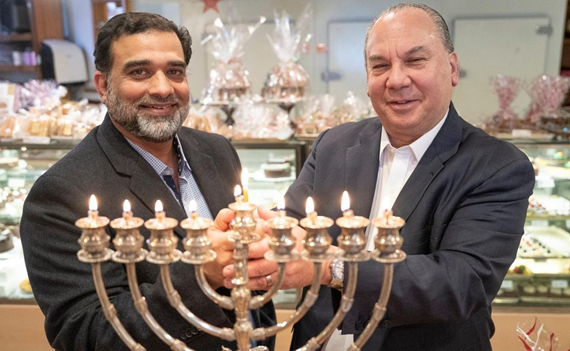By Bart Jones
Long Island / Suffolk – ONLY IN NEWSDAY
December 17, 2023

Rashid Sulehri, left, owner of the only kosher bakery on the East End, said his goal is to get the Jewish and Muslim communities together under one roof and to share what they have in common. (Credit: Randee Daddona)
War is raging in the Middle East, but in Westhampton Beach an example of peaceful coexistence between Muslims and Jews is thriving.
About five years ago, Rashid Sulehri, a Muslim immigrant from Pakistan, bought the only kosher bakery on the East End — and kept it kosher to serve the area’s Jewish population. He also made it halal, so Muslims can eat there, too.
While tensions between Muslims and Jews have increased throughout the United States and other parts of the world, the Beach Bakery & Grand Cafe has turned into a symbol of how the groups can get along despite differences.
The cafe “is a profound example as to ways that Muslims and Jews can celebrate the spirit of cooperation and not conflict,” said Rabbi Marc Schneier, who leads The Hampton Synagogue in Westhampton Beach.
—
WHAT TO KNOW
- A bakery and cafe in Westhampton owned by a Muslim is the only kosher business on the East End.
- The Beach Bakery & Grand Cafe serves a large Jewish population in the area and has become a symbol of Muslims and Jews living in peaceful coexistence.
- One prominent local rabbi is using the cafe to host interfaith dialogue sessions between Jewish college students and Muslim leaders.
He is deeply involved in interfaith work both through the cafe and around the country and the world.
—
“The example that we set in Westhampton Beach is an authentic source of light that needs to radiate around the greater communities” locally and throughout the United States, he said.
Sulehri said he has been steadily building bridges between Muslims and Jews at his business, though the recent bloodshed has presented the greatest challenge yet. A surprise attack by the militant group Hamas on Oct. 7 left about 1,200 Jews dead. Israel’s counteroffensive in Gaza has left more than 18,600 Palestinians dead.
But Sulehri said the cafe has remained an oasis where the conflict far away has not broken the ties the two communities are building.
“The international politics and warfare stay out of our community,” he said. “Things that are out of our control … we should not be worried about.
“We should all always think and focus on what is more common between us instead of differences,” he added. “One thing that is common, I see everywhere, everybody wants peace everywhere around the world.”
Schneier has made the cafe a home base for specific efforts to find common ground between the groups amid the strife. Recently, he brought 35 Jewish college students from New York City to the cafe to meet with Muslim leaders, including a prominent imam from Queens.
The two groups may not see the situation in Israel and Gaza the same, he said, but they keep the conversation civil and respectful.
“It has gone swimmingly well,” Schneier said. “We can agree to disagree without being disagreeable. We’re not going to resolve a conflict 6,000 miles away.”
Schneier’s synagogue also hosted a recent Hanukkah party at the cafe that attracted about 90 Jewish people. One night toward the end of the eight-day festival, the rabbi and the Muslim cafe owner lit a menorah candle together.
Muslims also gather at the cafe for major religious holidays such as Eid al-Fitr, the festival that marks the end of the holy month of Ramadan.
The bakery regularly caters events at local synagogues as well as mosques in Suffolk County. It sells everything from Jewish and Turkish sweets to wraps to challah — traditional Jewish bread.
There is no pork, because eating it is prohibited under both kosher and halal restrictions, or any meat at all, because observant Jews can’t combine meat and dairy. There is also no alcohol because practicing Muslims are prohibited from drinking.
The entrance of the cafe looks like an inviting old hotel, with a brown-and-white striped awning and an elevated front porch with potted flowers. Inside is a large, cozy room with a long row of shiny glass cases displaying everything from cannolis to cakes to fried jelly croissants. Tables are spread throughout where customers while away a morning or afternoon munching and chatting with friends.
In the summer, the lines are out the door.
While people try to keep talk of politics civil, they also chat about things like real estate, the Hamptons scene and, of course, the food, Sulehri said.
Long Island is home to an estimated 300,000 Jews and 100,000 Muslims, according to community leaders. Westhampton’s overall population swells in the summer, and is augmented by people taking day trips to the Hamptons.
Sulehri came to the United States from Pakistan in 1995, when he was in his early 20s. He spent several years living in the Rockland County hamlet of Monsey, which has a large Orthodox Jewish community. He also worked in a kosher supermarket while he was studying at nearby Rockland Community College, and learned the rules of keeping kosher.
He later moved to Long Island, and opened the Montauk Bake Shoppe and Villa Italian Specialties in East Hampton. When his real estate broker told him about the cafe going up for sale, and the local Jewish community worried it would not remain kosher, he jumped at the chance.
People of both faiths say the cafe has become a popular gathering spot.
Sulehri’s “idea was not only making money or making a profit,” said Adnan Cinar, 33, a Muslim from Amityville who often travels to the cafe with his family. “He wants to be focused on the communities. He’s a peace ambassador.”
Shari Israel Zuckerman, a Jewish woman who lives in Westhampton Beach, is also a regular at the cafe.
“There hasn’t really been any friction, to the best of my knowledge, ever or especially now,” she said. “It is a definite sign of hope that people can get along. Sometimes it’s just governments, shall we say.”
Schneier, noting that Islam and Judaism have many things in common, said he hopes the example of the cafe spreads more widely.
“We’re living in a bubble,” he said. “With all this conflict between Muslims and Jews raging around us, here in the Hamptons, in Westhampton Beach, it’s a lovefest.”
—
By Bart Jones
Bart Jones has covered religion, immigration and major breaking news at Newsday since 2000. A former foreign correspondent for The Associated Press in Venezuela, he is the author of “HUGO! The Hugo Chavez Story from Mud Hut to Perpetual Revolution.”
—





